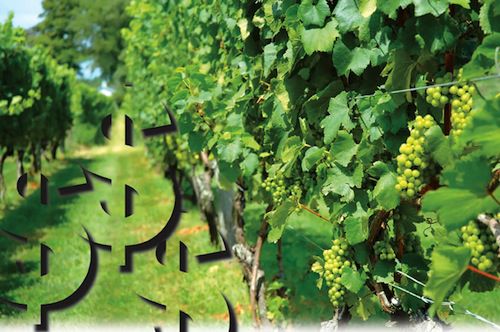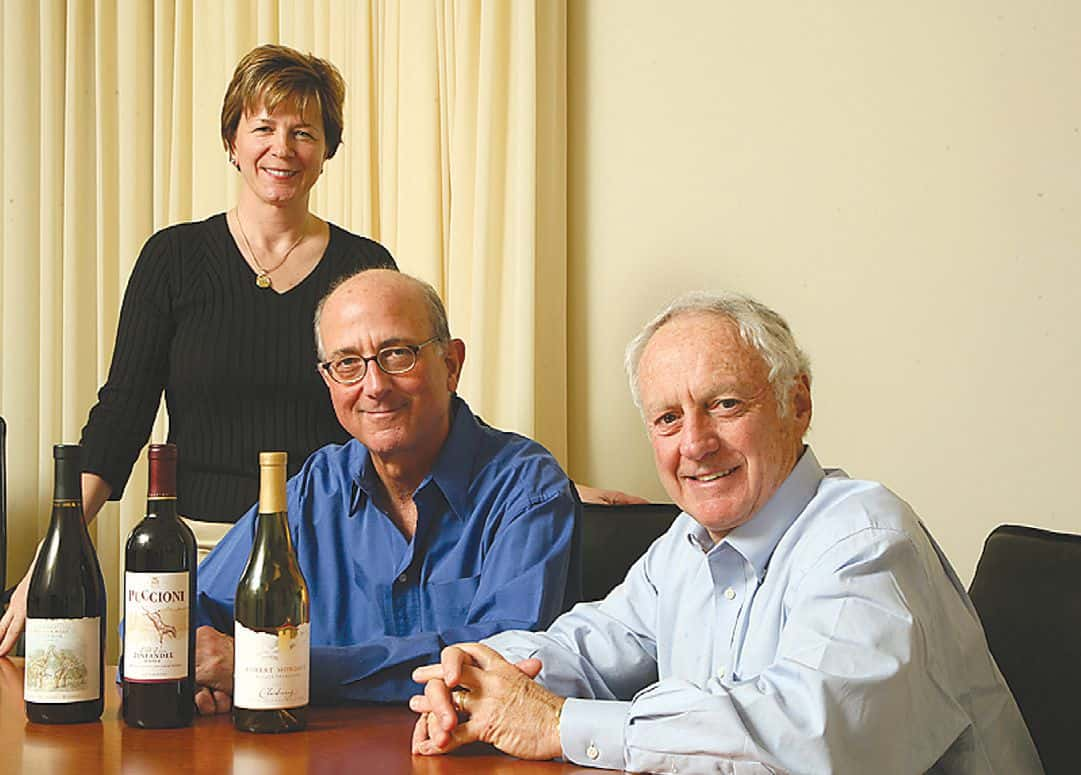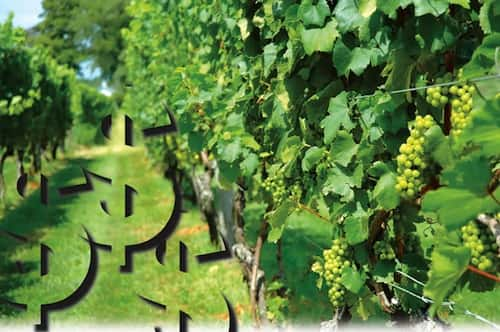
The noted investment guru Mark Twain once offered this advice, “Buy land. They’ve stopped making it.”Alas, Twain wasn’t in the midst of a cable infomercial, nor sharing a stage with the likes of Donald Trump and his hair in a sold-out hotel ballroom filled with what Twain himself would surely have referred to as “rubes” looking to learn to make a fortune in real estate with no money down.
It should be noted that before Twain turned toes up, he filed for bankruptcy. He also wrote, “No real estate is permanently valuable but the grave.” Clearly, his real estate investment strategy was somewhat flexible.
One thing he didn’t put down on a page, however, is how to pay for the real estate, be it wide open spaces or a six-foot plot of lawn. This advice might truly have been worth something—especially in light of the price an acre of WineCountry land now brings.
It’s a shame Twain never made Joe Ciatti’s acquaintance; otherwise, that pesky query might have been answered. Ciattiis chairman and CEO of a company called Vintage WineTrust. Tucked away on the third floor of a stylish building on the former site of the Marin Independent Journal (the daily has long since moved to Novato into a decidedly unstylish building), Ciatti and his compatriots believe they’ve solved the whole buying-Wine-Country-land riddle.
Seated in a conference room overlooking Mission San Rafael and two mid-rise office buildings locked in mortal combat, Ciatti explains the key to buying some of the most expensive vineyard land in the world is to sell off the land you already own. And then lease it back. It’s an idea that would have undoubtedly found Mr. Clemens putting pen to paper.
First things first
 Founded in January of last year, Vintage Wine Trust is the first real estate investment trust in the United States dedicated to the notion of buying vineyards and other real estate assets related to the wine industry to produce investment returns. In the simplest terms, Ciatti and Co. make their investors money by buying up wine-related property and facilities and leasing the asset back to the former owners or new operators.
Founded in January of last year, Vintage Wine Trust is the first real estate investment trust in the United States dedicated to the notion of buying vineyards and other real estate assets related to the wine industry to produce investment returns. In the simplest terms, Ciatti and Co. make their investors money by buying up wine-related property and facilities and leasing the asset back to the former owners or new operators.
The lease-back structure appeals to property owners, since the trust pays them the market rate for all of the land and facilities, while vineyard operators maintain control of the property via a lease which allows for continued operation, consistent crop management, longer-term planning, secure production and, most important, the working capital to expand either vineyard operations on that property or buy new land.
The key is, property owners can get their land or business’ full market value out of the deal. Typically, if a vineyard owner went to a bank for a loan tied to the land or to refinance the property, the best he or she would see would be closer to 60 percent, leaving the vineyard owner with about 40 percent of the equity locked up and less cash to make any moves.
Time for another Twainism. The author wrote, “Necessity is the mother of taking chances.” Though many scholars believe Twain to be calling necessity a mutha, what he’s actually saying is that sometimes circumstances dictate a rolling of the dice. He could’ve been referring to the combination of factors that have contributed to the land run up in both Sonoma and Napa counties.
While anyone with better than five minutes in the Bay Area can tell you California real estate has certainly enjoyed a nice run, most of the attention has been paid to residential and commercial properties. With a per-acre value ranging from $180,000 to$250,000 (in some cases even higher), buying vineyard land has largely become the specialty of liquor conglomerates that buy established wineries lock, stock and fermentation tanks in the name of collecting brands and furthering market share. For deep pocket players like Constellation Brands (whose Constellation Wines division produces, markets and sells such recognized names as Ravenswood, Vendange and Woodbridge and PrivateSelection from Robert Mondavi), financing such buy-ups isn’t a difficult proposition. But for a smaller producer or a family winery, getting enough cash to either grow or improve a facility without cutting into capital needed for operations can be a tall order. And the winery business is a capital-intensive pursuit.
Prosperous plantings
It really doesn’t matter whether you explore the steep Madrone-and laurel-covered slopes of Mount Veeder in Napa or the wetlands that give way to the rolling hills of the Carneros appellation, the Wine Country is among the most bucolic land of any wine region in the world. Wine aficionados travel from the four corners to taste and invest in world-class wines produced from the fertile vineyards in our backyard.Winemakers know that well tended vines produce vintages that are money in the bank.
This is where Vintage Wine Trust sees the opportunity.Thanks to $159.4 million raised through a private stock offering to wealthy investors and institutions, resulting in net proceeds to the company of approximately $145 million and a credit facility of $150 million (with the ability to add another $100 million), Vintage has become a player in less than two years. The company has already acquired $141 million worth of land in Fresno, Mendocino, Napa, Sonoma, Monterey and San Luis Obispo counties, and there’s some $400 million worth of acquisitions in the pipeline.
The company has elected to operate as a real estate investment trust (REIT), which has certain tax advantages. To begin with, Vintage pays no corporate income tax because of the REIT status, but it must distribute at least 90 percent of the taxable income to shareholders. Trusts have been described as being like a mutual fund that only invests in real estate. Like a mutual fund, investors own shares in the company, and the company pays a quarterly dividend. Typically, a REIT tries to match expertise in a specific type of real estate with the ability to attract equity and use a conservative amount of leverage (the amount of financing placed against a property) on financing properties. REITs typically raise money by offering stock for sale as well as other financial instruments. Though only a private stock offering has occurred thus far, Vintage has already registered with the Securities and Exchange Commission and is working through the process for an initial public offering (IPO). The as-yet-unscheduled IPO will give investors a chance to invest in real estate without actually purchasing property or lining up financing.
Moreover, Vintage has been structured as an UPREIT,which basically means the company can issue operating partnership units in an acquisition, which gives the seller an opportunity to defer taxes until the units are converted to commonshares. This particular feature can be helpful for family-owned wineries that want to structure the ultimate pay-out to allow for estate planning. The partnership units also return a dividend (like common stock) to the holder.
Established roots
Vintage Wine Trust’s CEO Ciatti has roots in the wine industry. His grandfather founded Geyser Peak Winery in1934. In 1971, Ciatti struck out on his own and began brokering grapes and bulk wine on an international scale.Today, he’s still president of Joseph W. Ciatti & Co., with offices in Chile, France, Australia, Argentina and Canada, as well as in the same building as Vintage Wine Trust.
The elevator gets a good workout.
At any rate, Ciatti’s background is clearly in wine, but real estate? The real estate expertise comes from COO Richard Shell and CFO Tamara Fischer. Shell is a director of Wine Business Communications, the parent company of Wine Business Monthly, Wine Business Insider and Wines & Vines. Prior to his career in publishing, Shell was an attorney specializing in real estate. Fischer was executive vice president and CFO for Chateau Communities Inc., a $2 billion real estate investment trust dealing in investment and ownership in manufactured home communities. Her REIT background should provide a strong knowledge base when the company goes public.
Ciatti sits at a conference table, his hands pushing a business card around. His white hair frames a face that’s seen its share of sun and vineyards. Dressed casually in an Oxford button down and khakis, he looks like he could be a gentleman farmer as he explains why winery financing isn’t easy. “To begin with, wineries are still regarded as an agriculture-based business, which bring with them a higher risk factor than other types of real estate,” he says. “You have the uncertainty of weather, harvest, quality of grapes as well as the market for wine itself. We, on the other hand, understand the risks involved because we come from a wine background. We see our company and the sale-lease back structure as a win-win for the operators who sell to us.”
Growing up
In 2004, the investment bank Friedman Billings Ramsey (FBR) approached Ciatti about the idea of a REIT zeroing in on wine property. At the time, FBR had clients from Australia, where the “wine REIT” is more common, looking to make a move here. Thus was the genesis of Vintage Wine Trust. The company is privately held, with Ciatti, Shell and Fischer all stockholders, along with others who invested in the private offering.
To raise the cash for a private offering, Vintage did a road show in early 2005, meeting with investors all over the United States and Canada. “We went out and explained what we saw as an opportunity,” Ciatti says. “We were out there for three weeks, and we met with a lot of people. It went well.”
It seems to be an idea whose time has come. There are other companies looking at investment opportunities in vineyards. Global Wine Partners, an offshoot of St. Helena-based wine consultant and accounting firm MKF Group, is teaming with Australia’s International Wine Consultants to forma REIT as well as a possible equity fund for winery investment. Premier Pacific Vineyards, based in Napa, is a firm dedicated to acquiring, developing and selling top-notch vineyards in America’s best wine regions.
Premier believes that not only will wine continue to be the most popular adult beverage in the United States, but also that life is too short to drink cheap wine. Its investment philosophy convinced the largest public pension fund in America, the California Public Employees Retirement System, to commit a cool $200 million in equity to the company.The Vintage formula has nothing to do with the inherent risks involved with development of land, even if that land is a vineyard and not a condo complex. “We’ll go anywhere for the land,” Ciatti says.
Most REITs try to keep their portfolio diversified by not having too many properties in one geographic location, lest property values plummet in a single market. This particular strategy may be particularly important for vineyards as natural disaster, an infestation or even a labor shortage could doom a harvest. So Vintage will shop vineyard and winery assets throughout the United States, including those of Oregon and Washington where Pinot Noir is king, and the company will scour the Central Coast for Chardonnay. It may even consider the sleepy vineyards of El Dorado County where they call Zinfandel “daddy.”
“We’re most concerned with the operations of the vineyard going forward after the sale,” Ciatti says. “We want our lessees to be successful; after all, we need them to earn a profit while first and foremost being able to make their lease payment.
The bottom line
The lease terms are standard triple net, meaning the lessee is responsible for operating expenses, taxes, repairs and maintenance of the land and equipment. With that in mind, Vintage is careful to keep an eye on the store. “We visit each of our properties four times a year to make sure all is well,” Ciattisays.
Most leases are for 10 years, giving the lessee security and the ability to plan longer term. The majority of the leases also contain three five-year renewal options; there may also be an option to buy back the asset at either a prearranged price or market value at the end of the lease term.
Vintage considers land with a minimum value of $2 million and will pay cash, assume debt or issue operating units (or a combination of all three). To protect investors and ensure cash flow, the company typically charges one percent of the purchase price as additional first-year rent—a hedge against initial operating worries.
So far it’s working. Ciatti says the targeted returns to investors fall between 12 and 15 percent. “We’re old wine guys; we know what we’re doing,” he insists.
Twain once said, “Never refuse to do a kindness unless the act would work great injury to yourself. And never refuse a drink under any circumstances.” Twain sounds a bit like an old wine guy.




